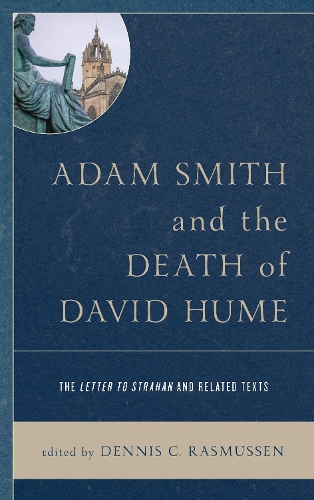
Adam Smith and the Death of David Hume: The Letter to Strahan and Related Texts
(Hardback)
Publishing Details
Adam Smith and the Death of David Hume: The Letter to Strahan and Related Texts
By (Author) Dennis C. Rasmussen
Bloomsbury Publishing PLC
Lexington Books
15th September 2018
United States
Classifications
Professional and Scholarly
Non Fiction
Ethics and moral philosophy
Political science and theory
128
Physical Properties
Hardback
108
Width 164mm, Height 228mm, Spine 15mm
399g
Description
The Letter to Strahan is an ostensible letter that Adam Smith wrote on the last days, death, and character of his closest friend, the philosopher David Hume, and published alongside Humes autobiography, My Own Life, in 1777. Other than his two books, it is the only work that Smith published under his name during his lifetime, and it elicited a great deal of commentary and controversy. Because of Humes reputation for impiety, Smiths portrayal of his friends cheerfulness and equanimity during his final days provoked outrage among the devout. Smith later commented that this work brought upon me ten times more abuse than the very violent attack I had made upon the whole commercial system of Great Britainmeaning, of course, The Wealth of Nations. This is the first annotated version of this fascinating and important work. Along with the Letter to Strahan, the volume also includes Humes My Own Life, the work to which the Letter was a kind of companion piece; two personal letters related to the Letter; and three published responses to the Lettertwo viciously critical and one generally favorable. A substantial editors introduction discusses the context, composition, publication, and significance of the Letter, along with the strong reaction that it provoked. Taken together, the works included in the volume provide an entertaining and accessible entre into some of the most controversial debates over religion and morality in the eighteenth century.
Reviews
Dennis Rasmussen has brought Adam Smiths famous letter on the death of David Hume together with an array of fascinating and witty responses to Smith. He also provides excellent notes on these documents and an extremely illuminating introduction, making clear how important Humes death was to generations of religious people in Britain. This is an invaluable collection for scholars, but also very accessible to the general reader. I look forward to using it in my undergraduate classes, to introduce the 18th-century debate over the relationship between religion and morality. -- Samuel Fleischacker, University of Illinois, Chicago
Dennis Rasmussens edition of Adam Smiths elegant and intensely controversial "Letter to Strahan" and of six associated texts (including Humes autobiographical My Own Life, with which the "Letter" was originally published), is a splendid contribution to our understanding of Smith, Hume, and their context. In his engaging and learned Introduction, Rasmussen discusses the "Letter" and also, among other things, the question of the relation between morality and religion that vexed so many readers of Smiths tribute to Hume. Rasmussens meticulously prepared volume is essential reading for anyone interested in Smith, Hume, or the Scottish Enlightenment. -- Charles Griswold, Boston University
This is an excellent collection of source texts with very helpful editorial guidance by Dennis Rasmussen. It will prove useful to scholars and students in the classroom. In addition, the material in this volume will be of interest to those curious about how to live a meaningful life in a commercial age. -- Eric Schliesser, University of Amsterdam
This wonderful volume is the first to feature the most overlooked of the few works Adam Smith published during his lifetime, the Letter to Strahan, along with critical correspondence on the subject of it and its reception, as well David Hume's autobiographical essay. Taken together, the pieces in this short volume throw Smith and Hume's friendship, their philosophy, and their theology all into stark relief, and Rasmussen's excellent accompanying notes and references will be an exceedingly helpful guide to students and scholars alike. A truly valuable collection for anyone interested in exploring the interplay of morality and religion in eighteenth century philosophy. -- Michelle Schwarze, University of Wisconsin
Author Bio
Dennis C. Rasmussen is professor of political science at Tufts University.
